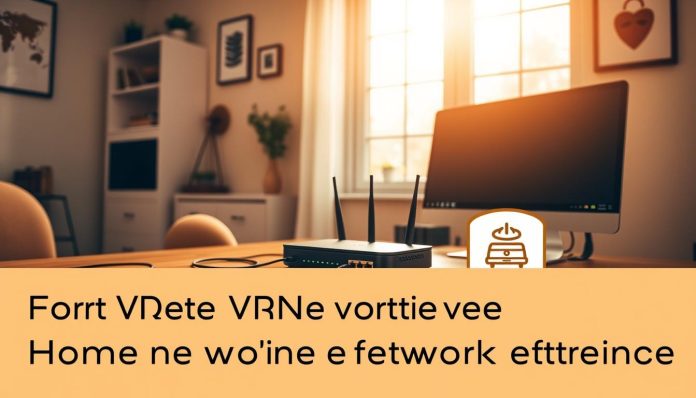As you add more devices to your home network, the risk of cyber threats grows. Protecting your home network is key to keeping your personal data safe. It also ensures a secure online experience for everyone in your family.
OpenDNS says their settings work on all devices connected to your network. This includes laptops, smartphones, and game consoles. By following a VPN setup guide and DNS filtering, you can greatly improve your network’s security.
This not only keeps your devices safe from malware and unauthorized access. It also makes sure your browsing is safe. A secure home network is your first defense against cyber threats. It’s a vital part of your digital security plan.
Key Takeaways
- Implementing a VPN and DNS filtering enhances home network security.
- A secure home network protects all connected devices from cyber threats.
- Using a VPN setup guide can simplify the process of securing your network.
- DNS filtering provides an additional layer of protection against malware and unauthorized access.
- A secure online experience is crucial for protecting personal data.
Why Use a VPN and DNS Filtering?
Online threats are getting worse, making VPNs and DNS filtering key for home network safety. These tools team up to fight off many cyber dangers.
Understanding VPNs and Their Benefits
A Virtual Private Network (VPN) makes a safe, encrypted link between your device and a VPN server. This keeps your data safe from hackers, especially on public Wi-Fi.
Key benefits of using a VPN include:
- Encrypting your internet traffic to protect your data
- Masking your IP address to maintain anonymity
- Securing your connection on public Wi-Fi networks
Using a VPN boosts your online privacy and security a lot.
What Is DNS Filtering?
DNS filtering is a security tool that blocks bad websites by filtering out harmful content at the DNS level. It stops threats like malware, phishing sites, and bad content.
Cisco Umbrella protects against internet threats, including malware, phishing, and ransomware.
DNS filtering is a big part of keeping your network safe. It stops cyber threats before they hit your devices.
How They Work Together
A VPN and DNS filtering together offer a strong security package. The VPN encrypts your internet, and DNS filtering blocks bad websites and content.
This combo keeps your online actions safe from many angles. It gives you better security and peace of mind.
The benefits of combining VPN and DNS filtering include:
- Enhanced protection against cyber threats
- Improved online privacy through encryption and content filtering
- A more secure online environment for all devices on your network
Choosing the Right VPN for Your Needs
A VPN is key for keeping your home internet safe. But, picking the right one can be tough. Many VPN services offer different features and benefits.
When choosing, think about a few important things. Look at how well the VPN secures your connection. Check if it works with your devices. And see how it affects your internet speed.
Popular VPN Service Providers
Top VPN providers include ExpressVPN, NordVPN, and Surfshark. They are known for strong security, lots of servers, and easy-to-use interfaces.
- ExpressVPN: Offers fast connections and great customer support.
- NordVPN: Provides top security with double encryption and no logs.
- Surfshark: A cost-effective option with features like CleanWeb for blocking ads.
Key Features to Look For
When picking a VPN, look for certain features. This ensures you get the best service for you.
- Security Protocols: Choose VPNs with strong protocols like OpenVPN, WireGuard, or IKEv2.
- Server Locations: A wide range of servers lets you access more content and keeps your connection stable.
- Device Compatibility: Make sure the VPN works with all your devices, like phones, laptops, and smart TVs.
- Kill Switch: A kill switch is vital. It cuts your internet if the VPN fails, keeping your data safe.
Pricing Considerations
VPN prices vary a lot, from a few dollars to over $10 a month. Think about your budget and what you want from the VPN.
| VPN Provider | Monthly Cost | Key Features |
|---|---|---|
| ExpressVPN | $12.95 | Fast connections, great support |
| NordVPN | $11.95 | Double encryption, no logs |
| Surfshark | $12.95 | CleanWeb ad-blocking, affordable |
By looking at these factors and what you need, you can find a VPN. It should keep your internet safe and improve your online experience.
Setting Up Your VPN
Setting up a VPN at home is easier than you think. It’s a crucial step in securing your online presence. With the rise in cyber threats, having a secure and private connection is more important than ever.
Step-by-Step Installation Guide
To start, choose a VPN service provider that suits your needs. Once you’ve selected a provider, follow these steps:
- Download the VPN software or app from your provider’s website.
- Install the software on your device, following the on-screen instructions.
- Launch the VPN application and log in with your credentials.
Choosing the right protocol is also crucial. Most VPN providers offer several protocols, such as OpenVPN, PPTP, or L2TP/IPSec. OpenVPN is often recommended for its balance between security and speed.
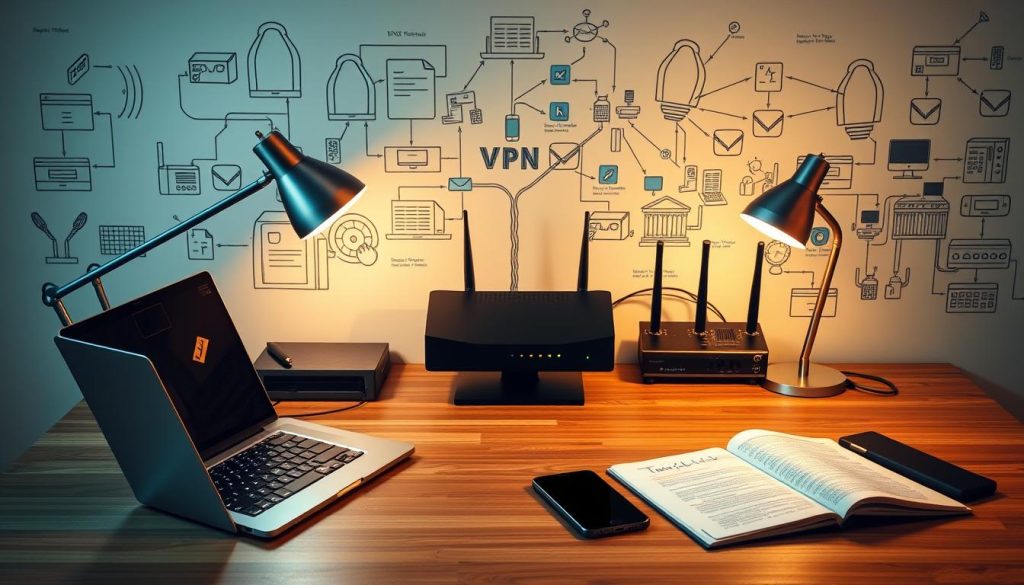
Configuring VPN Settings
After installation, you’ll need to configure your VPN settings. This includes:
| Setting | Description | Recommended Value |
|---|---|---|
| Protocol | The protocol used for your VPN connection. | OpenVPN |
| Server | The server location for your VPN. | Choose a server close to your location for better speed. |
| Encryption | The level of encryption for your VPN connection. | High (AES-256) |
Troubleshooting Common Issues
Despite the straightforward setup process, you might encounter some issues. Here are a few common problems and their solutions:
- Connection Drops: Check your internet connection and ensure that your VPN provider’s servers are operational.
- Slow Speeds: Try switching to a different server or protocol. Sometimes, servers can be overcrowded, leading to slower speeds.
For more complex issues, refer to your VPN provider’s support resources or contact their customer service for assistance.
Understanding DNS Filtering
DNS filtering boosts your online privacy and security. It controls the websites you can visit by blocking unwanted or harmful content.
What DNS Filtering Can Do for You
DNS filtering keeps you safe from bad websites. It also stops malware by blocking known threats.
OpenDNS Family Shield blocks adult content. It’s easy to use and great for families.
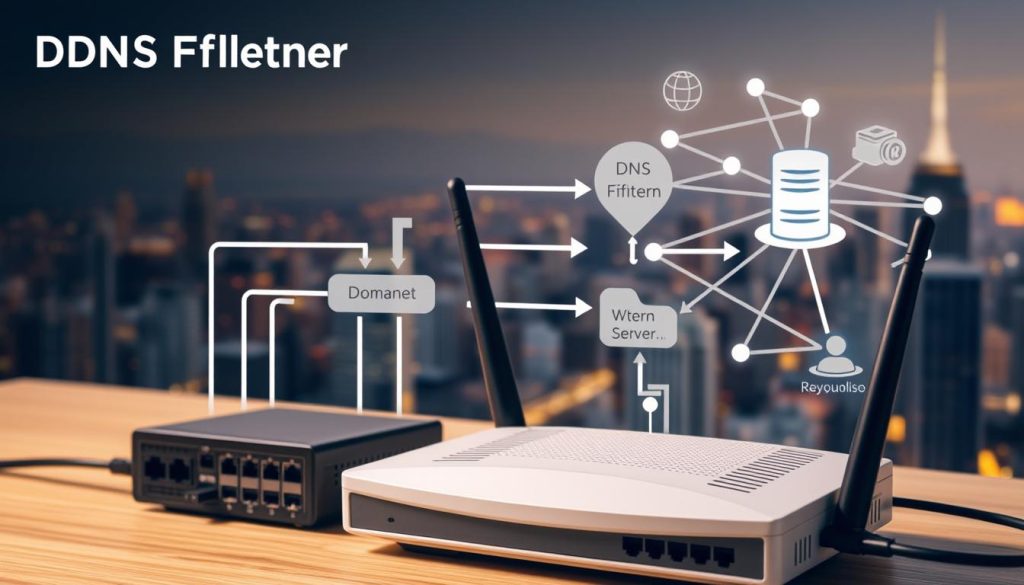
Types of DNS Filtering
There are different types of DNS filtering:
- Blacklist-based filtering: Blocks known bad sites.
- Whitelist-based filtering: Only lets you visit approved sites.
- Category-based filtering: Blocks certain types of websites, like adult content.
Benefits of DNS Filtering
DNS filtering offers many advantages. It makes your network more secure, helps you stay focused, and lets you control what you can see online.
| Benefit | Description |
|---|---|
| Enhanced Security | Blocks harmful websites and stops malware. |
| Improved Productivity | Reduces distractions, helping you work better. |
| Better Control | Allows you to decide what content is accessible. |
By using DNS filtering, you can greatly enhance your online safety and privacy.
How to Set Up DNS Filtering at Home
To keep your home network safe, setting up DNS filtering is key. It’s easy to do and helps control what content is accessible. This makes your browsing safer for everyone.
Choosing a DNS Filtering Service
First, pick a good DNS filtering service. Many providers offer different solutions. Look for one that’s easy to use, lets you customize, and offers strong security.
Cloudflare, OpenDNS, and CleanBrowsing are some top choices. Cloudflare, for example, has a clear guide for setting up DNS filtering. It’s great for securing your home network.
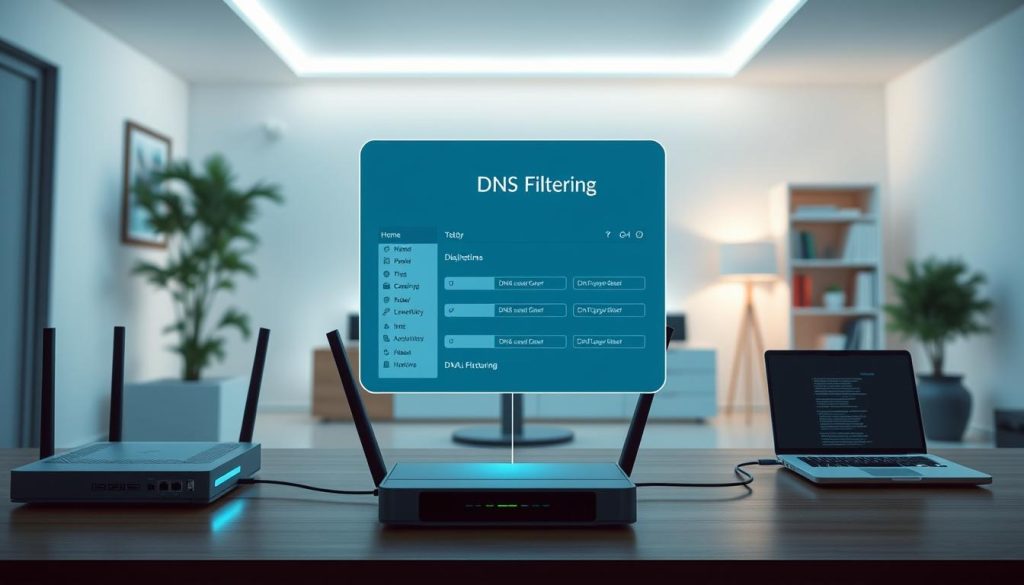
Step-by-Step Configuration Guide
Setting up DNS filtering is simple. Here’s a basic guide to start:
- Choose a DNS filtering service that fits your needs.
- Go to your router’s settings and find the DNS section.
- Change the DNS servers to the ones from your service.
- Save your changes and restart your router.
For more detailed steps, check your service’s guide. Cloudflare’s guide is a good example.
Monitoring and Managing DNS Requests
After setting up DNS filtering, watch and manage DNS requests. This ensures your network stays secure. Most services have dashboards for this.
| Feature | Description | Benefit |
|---|---|---|
| Real-time Monitoring | See DNS requests live to spot threats fast. | Quickly respond to threats. |
| Custom Filtering Rules | Make rules to block or allow certain sites or categories. | Custom security for your needs. |
| Reporting and Analytics | Get detailed reports on DNS requests and filtering. | Deep insights into your network. |
By following this guide and using your service’s features, you’ll boost your home network’s security.
Integrating VPN and DNS Filtering
Combining VPN and DNS filtering boosts your online security. This mix offers strong protection for your home network against online dangers.
Benefits of Combined Use
Using VPN and DNS filtering together has many benefits. Enhanced security is a key advantage. It adds layers of protection against malware, phishing, and other cyber threats.
- Improved privacy: Encrypting your internet traffic and filtering DNS requests keeps your online privacy safe.
- Comprehensive threat protection: This combo guards against a wide range of threats, including malware and phishing attacks.
- Secure remote access: It ensures safe access to your home network for remote workers.
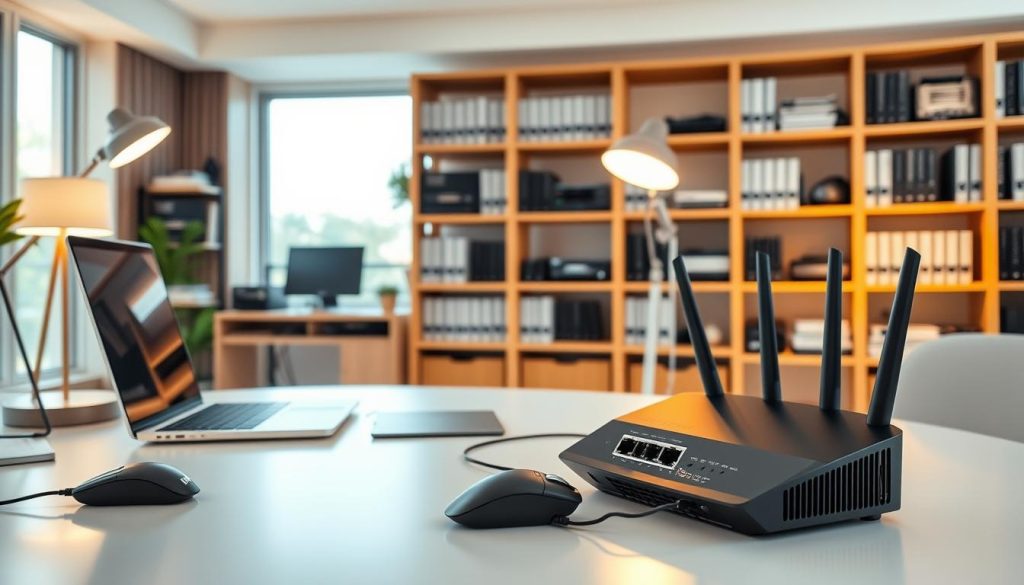
How to Configure Both Together
To set up VPN and DNS filtering together, follow these steps:
- Install a VPN client on your device and follow the provider’s setup instructions.
- Choose a DNS filtering service and configure your router or device to use their DNS servers.
- Make sure your VPN uses the DNS filtering service for all DNS requests.
It’s important to follow the specific instructions from your VPN and DNS filtering service providers. The steps might differ.
Testing Your Setup
After setting up VPN and DNS filtering, test your setup to make sure it works. You can do this by:
- Checking your IP address to see if it’s masked by the VPN.
- Visiting websites known to be blocked by your DNS filtering service to see if they’re blocked.
- Monitoring your network traffic to ensure all DNS requests are filtered.
By integrating VPN and DNS filtering, you get a secure home internet experience. It protects you from many online threats.
Ensuring Enhanced Security
When you set up your VPN and DNS filtering, think about more ways to keep your online space safe. A good security plan has many layers.
Additional Security Measures
There are steps beyond VPN and DNS filtering to boost your online safety. One key action is to set up your firewall to block unwanted network access. Firewall configuration tips help you control incoming and outgoing traffic with security rules.
Also, use strong, unique passwords for all your accounts. Turn on two-factor authentication (2FA) when you can. This makes it tougher for hackers to get into your stuff.
Maintaining Privacy with Your VPN
To keep your privacy with a VPN, pick a provider with a strict no-logs policy. This means they don’t keep records of what you do online. Look for VPNs with kill switches too. These cut off your internet if the VPN fails, so your real IP address stays hidden.
Regularly Updating Your Setup
Cloudflare says it’s key to keep your security setup fresh. Make sure your VPN client and other security tools are current. Updates fix bugs and keep you safe from new threats.
Don’t forget to update your DNS filtering service too. Keep your filtering rules up to date to block new malware and threats. This way, you stay ahead of security risks as they change.
Common Mistakes to Avoid
Setting up a VPN and DNS filtering requires careful steps to avoid common mistakes. A wrong setup can weaken your network security measures. It’s important to know these mistakes to stay safe online.
Misconfigurations and Their Impact
Setting up your VPN wrong can put your data at risk. Not choosing the right VPN protocol is a big mistake. It can cause data leaks. Always use a trusted VPN setup guide for your VPN service.
Another mistake is skipping two-factor authentication. This makes your VPN easier to hack. Keeping your VPN software up to date is also key for security.
Oversights in DNS Filtering
DNS filtering is vital for network security. But, ignoring its setup can leave you open to threats. Not blocking malicious sites is a big oversight. It can let in phishing attacks and malware.
Not updating DNS filtering regularly is another mistake. This can leave your security outdated. Regularly check and update your DNS settings to stay safe.
Best Practices for a Secure Setup
To set up securely, follow best practices. Choose a trusted VPN service with strong security and an easy VPN setup guide.
For DNS filtering, pick a service that blocks threats well. Keep your DNS settings updated to fight new threats. A good VPN and DNS setup can greatly improve your network security measures.
Conclusion and Final Thoughts
Protecting your home internet with a VPN and DNS filtering is key. It keeps your online identity and data safe. By following this guide, you can greatly improve your online security.
Benefits Recap
A VPN encrypts your internet traffic. DNS filtering blocks harmful websites and unwanted content. This makes your home internet safer.
Safe Browsing Practices
To get the most out of it, practice safe browsing. Update your VPN and DNS filtering settings often.
Further Learning Resources
For more on securing your home network, check out Cloudflare’s website. It has lots of info on DNS filtering and online security.
